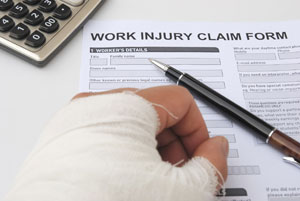 Workers’ compensation programs have been instituted in all fifty states, including New Jersey, to provide a streamlined process for injured workers to obtain benefits to cover lost wages and medical expenses. Unfortunately, a large percentage of claims, including many legitimate claims, are initially denied by workers’ compensation insurance companies. There are some valid reasons why a workers’ compensation claim will be denied:
Workers’ compensation programs have been instituted in all fifty states, including New Jersey, to provide a streamlined process for injured workers to obtain benefits to cover lost wages and medical expenses. Unfortunately, a large percentage of claims, including many legitimate claims, are initially denied by workers’ compensation insurance companies. There are some valid reasons why a workers’ compensation claim will be denied:
- The injury was not work-related
- You didn’t report the claim within the period of time required by law
- The injury may not be one that is covered by workers’ compensation—for example, some states don’t allow coverage of psychological injuries, including stress-related clai
- The injuries are not serious enough to prevent you from working
If none of the above situations applies and your claim has been denied, you are not necessarily out of luck. Every state, including New Jersey, has a process by which you can appeal the denial of a workers’ compensation claim. Often, you will find specific instruction on how to appeal the denial in the denial letter itself.
Before filing any formal appeal, you should contact the insurance company that provides workers’ compensation coverage for your employer. The denial may have been a mistake, or may have been based on erroneous or incomplete information.
In New Jersey, there are two ways you can appeal the denial of a work comp claim. To obtain a formal hearing, you must file what is known as a “claim petition.” An informal hearing may be arranged by submitting an Application for an Informal Hearing.”
The informal hearing process typically moves faster. Once you file your application, you will be assigned to a workers’ compensation judge and will receive notice of a hearing date. If you are unsatisfied with the judge’s ruling, you may still file a formal claim petition and seek a formal hearing.
When you request a formal hearing, you will be assigned to a “judge of compensation,” and will also be scheduled with a hearing date. However, that hearing may not take place for six months or more. In addition, the hearing will look more like a trial than a conversation (the informal hearing usually involves the judge asking questions of both parties). The formal hearing may include witnesses, as well as documentary evidence.
Contact Taylor & Boguski
At Taylor & Boguski, we bring more than 70 years of combined legal experience to injured people throughout New Jersey. For a free initial consultation, contact our office online or call us at 856-234-2233.


 As a parent, the last thing you want is to see your children suffer. In the midst of a divorce, though, you can do thing, often unintentionally, that cause a lot of confusion, anxiety and pain for your children. Here are some tips to minimize that risk.
As a parent, the last thing you want is to see your children suffer. In the midst of a divorce, though, you can do thing, often unintentionally, that cause a lot of confusion, anxiety and pain for your children. Here are some tips to minimize that risk. If you live in New Jersey, you expect that the area will be blanketed with snow at some point during the winter, and you know that ice storms and icy sidewalks can be a common hazard from October into April. But it begs the question—what are the duties of a landowner with regard to snow and ice?
If you live in New Jersey, you expect that the area will be blanketed with snow at some point during the winter, and you know that ice storms and icy sidewalks can be a common hazard from October into April. But it begs the question—what are the duties of a landowner with regard to snow and ice?